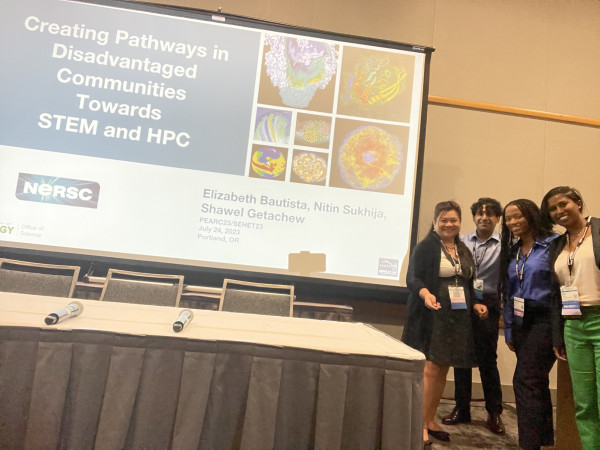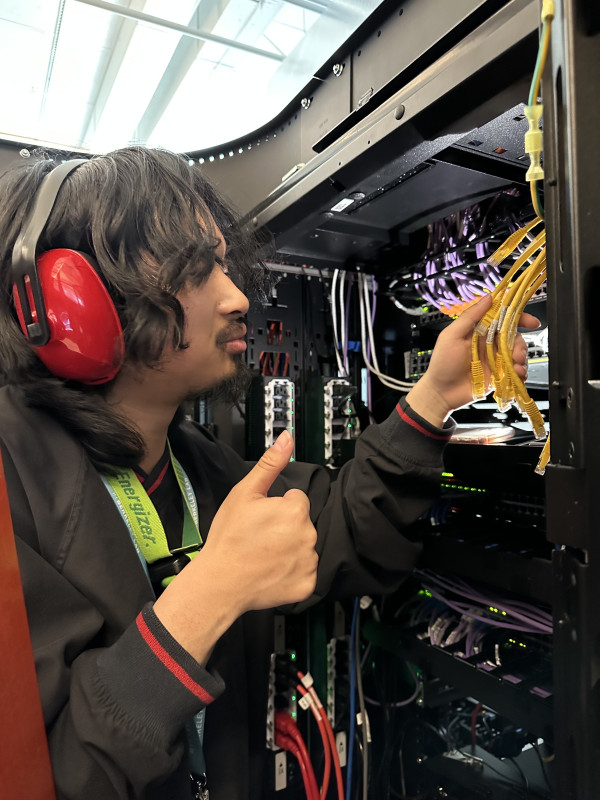NERSC Summer Interns Feel the Thrill of HPC
August 22, 2023
By Elizabeth Ball
Contact: cscomms@lbl.gov

Elizabeth Bautista poses with NERSC summer students Donjhai Holland (center-right) and Sofia Ponder (far right) after giving their conference talk.
For a handful of the summer interns at the National Energy Research Scientific Computing Center (NERSC) at Lawrence Berkeley National Laboratory (Berkeley Lab), the story of their internship didn’t begin as school was letting out. Through the STEM Core program at Laney College in Oakland, this group of interns has been working hard since last fall, preparing for summer work at employers like the Stanford Linear Accelerator, the Port of Oakland, and NERSC.
Through a collaboration between NERSC Operations Technology (OTG) group lead Elizabeth Bautista and a group of Laney faculty, the STEM Core program connects Laney students to coursework, academic support, mentorship, and ultimately career opportunities in STEM, IT, and HPC. Aimed at students who may not have much exposure to the field, the program begins with a preselected first-year course load of math and science and ends its first year with an internship. The goal is to help students gain marketable skills and experience in the short term while also preparing them for long-term success – and providing an expanded pipeline for organizations looking for HPC and IT talent. NERSC has collaborated with Laney in the past, including fielding and training a team of students for the Student Cluster Competition at the 2018 Supercomputing Conference. This program, however, is intended to prepare students from the beginning of their college careers.
“We want to let students know that if you take this series of classes, you will get the support you need,” said Bautista. “And if you are successful in the first year, we will help get you an internship.” Bautista herself is overseeing three Laney student interns at NERSC this summer, all rising second-years who will continue in the STEM Core program in the fall.
Two of those interns, Donjhai Holland and Sofia Ponder, are studying at Laney to support career changes – Holland previously worked in business and marketing, while Ponder comes from human resources. Both chose Laney as a way to pivot without taking on more debt, and were interested in working with computers but needed to build an educational foundation in the field from scratch. They say the learning curve has been steep, but gaining the technical skills they need to work in HPC is worth it – and they’re hungry for more.
“I have a previous career in an entirely unrelated field, HR, so almost all of this is new to me,” said Ponder. “I have the simultaneous challenge of learning to leverage my old soft skills in a new context while learning new technical skills.”
A third intern, Charlie Hoang, is a 2022 high school graduate who originally intended to study civil engineering, but found himself seeking out more computer science after taking an introductory class. He connected with Bautista, responded to her encouragement to apply for the STEM Core program, and is spending his summer learning as much as he can from NERSC staff – not bad for a first step into the professional world.
“This is my first job,” said Hoang. “I’m really honored that I get to do that here.”
Learning the Ropes of HPC
Though all three interns get some experience with a range of projects and tasks at NERSC, Holland and Ponder are spending most of their summer working on Phase II of the Matterport project, updating a 3D model of the HPC floor at NERSC to enhance an interactive map. An overview map showing the layout of the room and the location of each rack of assets already existed and has been a useful tool for NERSC staff to find systems when they need them, as well as a way of giving virtual tours of the facility during the COVID-19 pandemic shutdown.
Phase II of the project gets granular, capturing the contents of each rack to prepare for mapping them visually into OTG’s asset management system. Working together to wrangle the 3D camera, the students gain experience working with hardware and software in addition to that asset management system.
Hoang is working with the OTG and looking for a suitable replacement for oVirt, an open-source virtualization manager that manages the Operations Monitoring and Notification Infrastructure (OMNI) at the heart of the NERSC control room, the monitoring center that tracks activity at NERSC 24/7. OMNI collects more than 400,000 data points per second to monitor the real-time health of the facility’s systems, then archives that data for future analysis and decision-making. oVirt may soon reach the end of its life and needs to be replaced.
“My project experience has been really enjoyable primarily because of the collaborative work with my partner,” said Hoang. “We research different virtualization platforms, then discuss each one. It makes the process really fun.”

NERSC summer intern Charlie Hoang is helping with the search for a new virtualization manager for the NERSC control room.
Additionally, Ponder has been learning the basics of running the control room itself. Because she told Bautista she was “interested in everything,” Bautista suggested she try out operations work as a way of interacting with all facets of NERSC. As the summer comes to a close, she is training to become a cyber-liability engineer.
All three interns presented their projects at a full-day presentation session on August 8 to stakeholders at NERSC and other interested parties. In addition, Hoang presented the fruits of his project at a poster session on August 9. Before that, Holland and Ponder got a taste of the larger HPC landscape when they traveled with Bautista to present on their summer intern experiences at the Sixth Workshop on Strategies for Enhancing HPC Education and Training (SEHET23) at the PEARC23 Conference in Portland, Oregon, an experience they found challenging and affirming.
“We were so nervous to speak about our experience,” said Holland. “Everyone at the conference has so much knowledge! But we wanted to talk about what a wonderful experience this has been, and how much it means to us, and what it’s done for us. And the fact that they valued hearing that and wanted to congratulate us made us feel accepted into this new world that can be so intimidating.”
All three interns say their time at NERSC has stretched them beyond what they imagined of an academic internship – from experiences like making their conference presentation to understanding how day-to-day research fits into the larger picture of HPC. “This summer I learned not only about the theoretical aspects of research, but how to think past the research,” said Holland. “This has tremendously helped get past thinking like a student and put me in the mindframe of the actual implementation process.”
Looking to the Future
Summer may be coming to an end, but the interns’ time at NERSC will continue – they have been invited to stay for the fall and will continue their work in addition to studying at Laney. They’ll be taking Laney’s first data analytics course, the next step of the STEM Core program and part of a new data analytics track that Bautista and her faculty collaborators hope will become a certificate program. The curriculum is based on a popular program at UC Berkeley, and may also help students transfer into that program or similar ones at other four-year schools.
In the meantime, Holland, Ponder, and Hoang continue working and learning every day at NERSC, gaining a broad range of new experiences and considering their futures in computing science. According to Ponder, coming to work every day is a bit of a thrill:
“It’s such a rush,” she said. “It makes me so happy. I look forward to coming in, I’m excited—Liz [Bautista] will stretch you and have you in positions you feel are impossible for you, and then you start to see, oh, I am capable of doing this, I just have to take the time and learn it. And people are patient with me because they understand where I’m starting from and that there’s a steep learning curve. It’s pretty cool.”
About Computing Sciences at Berkeley Lab
High performance computing plays a critical role in scientific discovery. Researchers increasingly rely on advances in computer science, mathematics, computational science, data science, and large-scale computing and networking to increase our understanding of ourselves, our planet, and our universe. Berkeley Lab’s Computing Sciences Area researches, develops, and deploys new foundations, tools, and technologies to meet these needs and to advance research across a broad range of scientific disciplines.







 Instagram
Instagram YouTube
YouTube